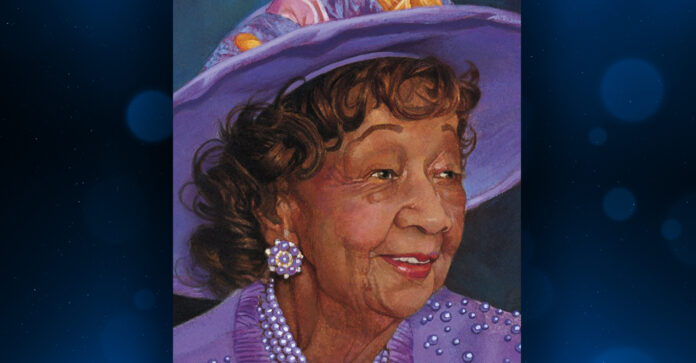
During the early Civil Rights Movement when women worked behind the scenes, Dorothy Height’s quiet power brought wisdom and a social worker’s perspective to deliberations and strategies of the “Big Six” civil rights leaders. With an understanding of the importance of power of location, she purchased a building in Washington, D.C. between the White House and the Capitol, the only African American owned building along that corridor of power.
By Alexis M. Herman, President of the Dorothy I. Height Foundation
April 20, 2020 marks the 10th anniversary of the death of our gentle but fearless leader and mentor, Dr. Dorothy Irene Height. This significant anniversary offers us an opportunity for reflection during these unprecedented times we are living in today.
Dr. Height undoubtedly was a creative, compassionate, and visionary leader. Her scholarship, travels and experiences shaped her understanding of power and how to navigate it with competence and kindness. Through the programs and initiatives she developed, she used her power to empower poor women and girls around the world.
During the early Civil Rights Movement when women worked behind the scenes, her quiet power brought wisdom and a social worker’s perspective to deliberations and strategies of the “Big Six” civil rights leaders. With an understanding of the importance of power of location, she purchased a building in Washington, D.C. between the White House and the Capitol, the only African American-owned building along that corridor of power.
For decades, her political power was put to use serving as an advisor to five U.S. presidents. She led some of the largest and most influential women’s organizations in American history, including her beloved National Council of Negro Women. And she achieved these accomplishments always wearing fabulous hats and an engaging smile.
While those achievements were immense, they pale in light of her greatest and most enduring accomplishments. During the turbulent times and critical issues that prevailed throughout her lifetime, Dr. Dorothy Irene Height was “A Bridge Over Troubled Waters.” Her activism started as a teenager by bringing her peers together to nonviolently protest policies that prohibited African American children from swimming, debating or going to school with Caucasian youth.
She bravely confronted and navigated the injustices and engaged adults who had the power to make changes. Over the years, issues such as racism, the struggle for economic and social justice, women’s rights, voter’s rights, equal access to education, healthcare and jobs, fair wages, and dignity for all, brought purpose and passion to her life.
When she walked into a room, wisdom, humanity, and hope arrived with her. She was the bridge to alignment and unity to many civil rights organizations and leaders. To African American, Caucasian, Latina, Asian, and Native American women organizations, she served as a bridge of vision and consensus in their pursuits seeking equality, equal pay, and jobs.
Through programs she implemented, she was at the forefront of the Y.W.C.A. realizing its most significant lifelong mission, eradicating racism. None of these were simple or easy undertakings, yet she courageously pursued what she knew to be right and good. Wherever the waters were troubled, she created a bridge, effective coalitions, and solutions.
Many of the critical issues of Dr. Height’s era persist today. Over fifty years ago, she called attention to the health disparities related to social detriments, especially for Black women and the elderly. Chronic health conditions such as hypertension, heart disease and diabetes were always at the forefront for education and outreach to our communities.
Today with thousands impacted by COVID-19 and millions who are unemployed, the consequences of these same health disparities are more apparent than ever. The troubled waters we now face have washed waves of reminders of the work our country still has to do. Leaders are searching for answers, managing fears and anxiety, and competing for vital resources in their communities.
In these turbulent, frightening, and uncertain times, we are called to embrace Dr. Height’s spirit of direct action, by courageously bridging the waters with viable solutions, to serve the needs of our brothers and sisters, to hold leaders accountable for environmental and social justice policies, to provide food for the many who are in need today, to protect and defend the right to vote, to be the voice of the voiceless, and to lead with purpose and passion toward a just and safe society.
Ten years after her passing, we must embrace her spirit to right the wrongs and keep navigating troubled waters until we reach calm seas and still waters that were always her goals for women and children, for the country, for all of us. Today we must not only remember Dr. Height, but also renew her fighting spirit, and be that “bridge over troubled waters” that we need and seek. Girded by our faith and in the spirit of Dr. Height, I pray that each of us will find ways, large and small, to courageously speak up, stand up, and reach out to bring truth and mercy to “the least of these.”
In the days and weeks ahead, we would do well to remember her words spoken at the dedication of the Headquarters Building of the National Council of Negro Women, “Through this last century we learned that it is in the neighborhoods and communities where the world begins. That is where children grow and families are developed, where people exercise their power to change their lives…. Building on my religious faith deeply rooted in my childhood and youth, I found my life’s work. I am the product of many whose lives have touched mine, from the famous, distinguished and powerful to the little known and the poor. The past has taught me many lessons—most especially, that I have a responsibility to future generations.”
In memory of Dr. Dorothy Irene Height, contributions may be made to the National Council of Negro Women at www.ncnw.org under donate.
Alexis M. Herman is the President of the Dorothy I. Height Foundation



